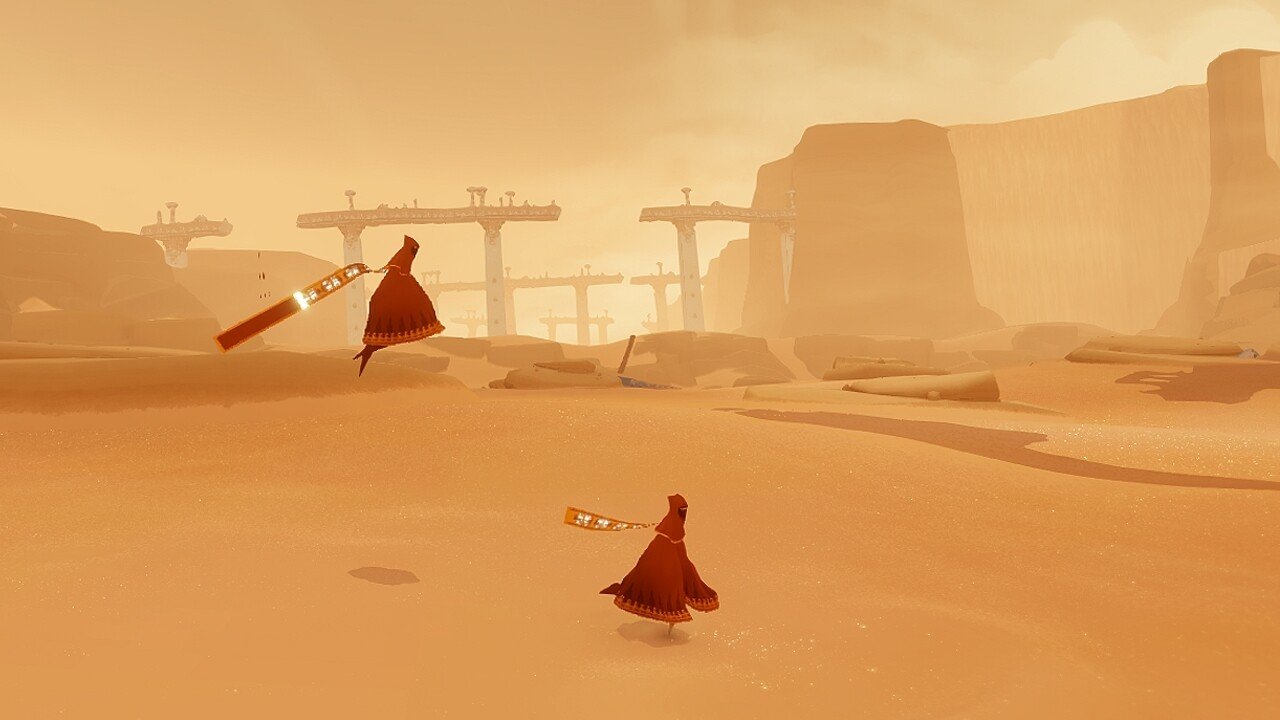thatgamecompany’s Journey has been nominated for the title of Best Compilation Soundtrack for Visual Media at the 55th Annual Grammys . Lots of people seem to be pretty excited about this, probably figuring that the recognition from such a noteworthy awards ceremony will help to garner more exposure for videogames. I loved Journey and thought that Austin Wintory’s score played a big role in creating some of the most memorable moments of the game, but, all the same, I can’t help but think that seeking recognition from an established awards vendor like the Grammys isn’t the best thing for the videogame medium.
Last year Christopher Tin’s Baba Yetu, an obnoxious world music hymn featured in Civilization IV, won a Grammy that similarly thrilled game players, but was technically honoured for its inclusion on an album by Tin, rather than its place in Firaxis Games’ world building sim. That award certainly didn’t set the world on fire and it isn’t likely that Wintory taking home the (increasingly irrelevant) music prize would cause videogames to experience a surge in mainstream popularity as a result either.
All of it begs the question of why exactly anyone is supposed to be particularly impressed by a game going up for an award that has, historically, turned its nose up at the medium.
Videogame music, like videogame stories, isn’t at its best when written in an attempt to emulate established media. The rest of the Best Soundtrack nominees in this year’s Grammys are more traditional, ranging from The Artist‘s unmemorable score to Trent Reznor’s and Atticus Ross’ excellent compositions for the The Girl with the Dragon Tattoo remake. Holding Journey‘s soundtrack up against these entries, as great as it is in context of the game, kind of misses the point of why that particular music was so enjoyable when most of us first heard it.
Austin Wintory’s compositions are one part of why Journey is one of the best games of the year, but, taken alone, the songs are not extraordinary pieces. They are, instead, beautiful works that must be accompanied by controlling a despairing red-robed figure as it huddles against a blowing snowstorm or the thrill of flying to the top of a mountain with an anonymous companion. Listened to independent of Journey’s gameplay these songs may still be pretty, but they’re not being recognized on the basis of the power they exhibited as videogame compositions. Just as Reznor’s and Ross’ Dragon Tattoo pieces may be stunning when embedded into the film’s narrative and visuals, taken alone they’re really nothing more than interesting, yet unremarkable songs.
(There’s a larger argument here for just ignoring Grammy nods for all non-music media, but this is a videogame column so I’ll move on.)
Forget the Grammys: pay attention when a soundtrack is awarded a prize by a group of critics who actually understand what makes games great.
This doesn’t just go for Journey, either. HEALTH’s absolutely fantastic soundtrack to Max Payne 3 includes some of my favourite compositions of the year, but listening to those songs on their own pales in comparison to, say, putting one of the band’s full-length albums on instead. How is the experience of the game’s climatic airport level, music encouraging a beleaguered Max to continue pushing on through waves of enemies, supposed to be replicated through audio alone? Something like the Grammy Awards will always miss the point of why our favourite videogame soundtracks are our favourites in the first place. Instead of hoping for mainstream acclaim, isn’t it better to look to game critics — the people who actually understand why some music works in an interactive setting and some doesn’t — for awards meant to demonstrate the best of the medium?
As long as the videogame industry — and, more importantly, game players — seek validation from outside sources, the medium will always resemble the little brother of better established forms of entertainment. Forget the Grammys: pay attention when a soundtrack is awarded a prize by a group of critics who actually understand what makes games great.




